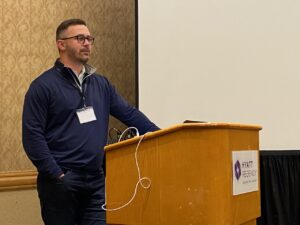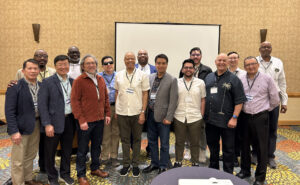
FORT WORTH, Texas (BP)–In an “interactive team-building seminar,” 56 education staff members from seven “cutting-edge” churches participated in a three-day workshop led by Christian futurist Leonard Sweet and Keith Kline, director of Southwestern Baptist Theological Seminary’s Center for Leadership Development.
“Leadership development of the future will be conversation-based, not [based] on people attending conferences,” Sweet said in an interview. “With this interactive team-building seminar, Southwestern is on the cutting edge of this new learning strategy.”
Sweet told the group that people’s method of learning is being rewired. Just as people no longer watch TV the same way they did in the days of “Father Knows Best,” the style of learning also is changing, and seminars need to change in order to reach the postmodern world.
“Seminars must change from the seminars in the past where the style was, ‘Come and hear a lecture,’ to a more relational style of, ‘Come and be a participant and a team-builder,'” Sweet said.
The seminar developed out of a meeting Kline had with “Cutting Edgucators,” a group of education leaders from what he described as “entrepreneurial-type churches that do whatever it takes to reach people.”
The workshop included three major components, beginning with a large-group dialogue and interaction time with Sweet. Participants then met in smaller groups with participants who shared the same ministry function in their church to discuss the implications for their ministry area based on the dialogue with Sweet. “Then each church’s team met to evaluate current programming and to develop strategies for implementing what was discussed in the larger groups,” Kline said.
Sweet, who said, “I don’t teach, I organize learning,” said the new concept of learning is based on “EPIC” — Experience, Participate, Image-Rich and Connection. “This is an entirely new paradigm which is changing where we are to where we must go.”
By comparing the new learning style to the most-watched television programs, Sweet has shown that people’s learning style has changed. The successes of television programs such as “Who Wants To Be a Millionaire?” transitions the audience from the rational to the experiential, from representative to participative, from word-based to image-based, and from individual to connected, Sweet said.
It is nothing more than EPIC programming, Sweet said, noting, “The recovery of Christianity in the next millennium is likely to be based on whether or not the church can carve, not cast, its ministries into more EPIC shape.”
The EPIC learning style allows everyone in the congregation to be involved in the service instead of only being attendees, akin to how “singing hymns and choruses back to back magnifies the experiential momentum of worship as opposed to stand-alone songs slotted into liturgical notches.”
“We need to be more passion-driven than purpose-driven,” said John Herring, pastor of discipleship at The Church at Brook Hills in Birmingham, Ala.
Herring said he began preparing his staff months in advance before the seminar by going through materials such as Sweet’s book “Post-Modern Pilgrim.” “I challenged my staff to study the material and have questions ready when they came,” Herring said, noting he was convinced it would make the workshop a success for his staff.
“We don’t have time to sit through the non-relevant lectures,” Herring said. “We need to get the information which is relevant to our needs quickly. This is not for shortcuts, but for experience itself.”
Herring said he could see “light bulbs popping” in his staff members’ minds as the seminar progressed. “These are the things we have been talking about, and as the seminar addressed the ideas and concepts, it started solidifying in our minds.
“I see this as the model of things to come in the future for teaching in our churches,” Herring said.
When asked why he would invest precious time, money and resources into a small conversational seminar, Herring answered, “We are about involving people in experiences. We need to share experiences together. The more experience my staff gets, the better language we have to communicate to our people. And the gospel is about communicating an experience to the people.”
Herring said he sees the new paradigm as being a more relational Bible fellowship, noting, “We want to be intentionally relational in all we do.”
“John Herring brought 14 people to the workshop,” Kline said. “He did an excellent job of preparing his staff prior to coming and then helping them evaluate the implications that came out of the seminar.”
“The learning experience of the future,” Sweet said of the workshop, is “a much smaller, relational, heavily interactive style. You study ahead of time, then come to interact to get specifically what is relevant to you and your group.”
Kline and members of Cutting Edgucators are planning another interactive team-building seminar next fall. Kline said church staffs that are invited to participate will again have preparation assignments to complete before the workshop.
Sweet is the author of more than 20 books and is currently the E. Stanley Jones Professor of Evangelism at Drew University in Madison, N.J. He also served as vice president of academic affairs and dean of the theological school for five years.
–30–
















